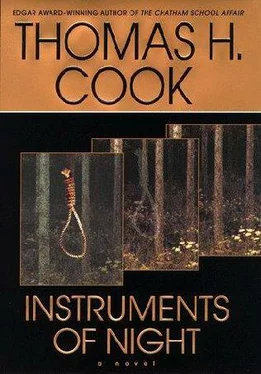Thomas Cook - Instruments of Night
Здесь есть возможность читать онлайн «Thomas Cook - Instruments of Night» весь текст электронной книги совершенно бесплатно (целиком полную версию без сокращений). В некоторых случаях можно слушать аудио, скачать через торрент в формате fb2 и присутствует краткое содержание. Жанр: Триллер, на английском языке. Описание произведения, (предисловие) а так же отзывы посетителей доступны на портале библиотеки ЛибКат.
- Название:Instruments of Night
- Автор:
- Жанр:
- Год:неизвестен
- ISBN:нет данных
- Рейтинг книги:3 / 5. Голосов: 1
-
Избранное:Добавить в избранное
- Отзывы:
-
Ваша оценка:
- 60
- 1
- 2
- 3
- 4
- 5
Instruments of Night: краткое содержание, описание и аннотация
Предлагаем к чтению аннотацию, описание, краткое содержание или предисловие (зависит от того, что написал сам автор книги «Instruments of Night»). Если вы не нашли необходимую информацию о книге — напишите в комментариях, мы постараемся отыскать её.
Instruments of Night — читать онлайн бесплатно полную книгу (весь текст) целиком
Ниже представлен текст книги, разбитый по страницам. Система сохранения места последней прочитанной страницы, позволяет с удобством читать онлайн бесплатно книгу «Instruments of Night», без необходимости каждый раз заново искать на чём Вы остановились. Поставьте закладку, и сможете в любой момент перейти на страницу, на которой закончили чтение.
Интервал:
Закладка:
“I wish she hadn’t done that,” Miss Davies said brusquely. She seemed reluctant to go on, but forced herself to do so. “Faye came to the house that morning. The last one. She came to the front door. I’d been sitting in the dining room, when I heard my father and my brother talking in the foyer. I walked to the entrance of the dining room. You can see the front door from there. That’s when I saw Faye. Through that window by the door. She was wearing her blue dress. The one I’d given her for her birthday the year before. She saw me too. I know she did, because she gave a little nod. I think perhaps she wanted me to meet her at Indian Rock.” She shook her head. “I’ve often wondered what might have happened if I’d gone to the door. Or stepped outside to meet her. We might have gone into the woods together. Up to Indian Rock. The two of us. I might have saved her life.”
“Or been murdered with her,” Graves said. He felt the bony hand on his shoulder, heard the voice, hard, raspy, What you doing here, boy? “It’s as easy for two people to be at the wrong place as it is for one.”
She studied him intently. “You’re a true Manichean, Mr. Graves. You believe that the world is divided between the forces of good and the forces of evil, and that in the end, it’s the evil forces that always win.”
Graves said nothing. It was not a charge he could deny.
“But the fact is, evil men are not always as strong and clever as the villain in your books,” Miss Davies told him. “I can assure you that Jake Mosley was neither strong nor clever. He was just a workman. Ordinary.”
“Did Faye know him?”
“Only by sight. The second cottage was being built that summer. Mosley was one of the workmen my father hired for the job. Faye didn’t know him, but he alarmed her.”
“Alarmed her?”
“She said she didn’t like the way he stared at her. She thought he was creepy, and when he stared at her she said she felt like he was… touching her with his eyes.”
Graves glanced toward the window, the mouth of the trail Faye had taken to her death. He saw a hand reach out, jerk her around. The fear was in her eyes, stark and terrible, as it had been in Gwen’s, the horror of her fate already fixed within them, that she was now the stuff of sport, would live only as long as her agony delighted.
When he turned back toward Miss Davies, he saw that she was peering at him darkly.
“You’re always imagining things, aren’t you?” she asked. “Terrible things.” She glanced away suddenly, avoiding Graves’ eyes, as if through them she’d glimpsed some hidden chamber of his mind. “Well, I’ll leave you to your work,” she said. She started to leave, reached the door, then turned back. The look on her face was one Graves had seen before. In movies. In life. The moment when the victim presses herself against the door, listens for the footsteps of the intruder.
CHAPTER 8
Graves spent the next minutes trying to adapt himself to his new surroundings, moving around the room slowly, like a cat in an unfamiliar dwelling, wary and uncertain. He’d done the same thing the first night he’d spent at Mrs. Flexner’s house. He’d been taken there after Gwen’s murder, Mrs. Flexner arranging the small bedroom just across the hall from her own. He’d tried to sleep, huddled beneath the covers despite the sweltering summer air, but the dread had finally urged him out of bed and into the house, where he’d stalked from room to room, wondering if he was still there somewhere, watching him behind the window or the drawn curtain, crouching inside a closet, waiting to leap out. He’d made it to the kitchen by the time Mrs. Flexner heard him, turned on the light, and found him standing by the sink, his body draped in one of her husband’s white nightshirts, the knife in his hand, something he’d seized for his own protection and intended to take into his bed. She’d taken the knife from him gently, placed it on the old wooden cutting board, and escorted him back to his room. “Keep the light on in here if you want to, Paul,” she told him.
And he had.
For fourteen months.
Although the office Miss Davies had made available to him at Riverwood was far different from any of the rooms he’d entered in Mrs. Flexner’s farmhouse that night, Graves found his current mood alarmingly similar to that earlier occasion.
The same sense of impending evil had driven him to develop various strategies over the years. He’d applied some of them to his work, learning to read books about crime and police procedure with a studied, academic distance, always careful to maintain a clinical mood by flipping past the photographs of the victims and avoiding all textual references to their actual personalities. By that means he’d turned an otherwise unbearable world into a series of case histories, where letters could easily stand for names, “A” murdered in one way, “B” in another. In this way he could avoid the fact that “A” had actually been a college student slashed to death in her dormitory bed, “B” an eight-year-old tied to a chair and set on fire. Graves knew that it was this distancing that allowed him to write his books, live his life. For as Kessler had written in one of his grimly taunting letters to Slovak, If you truly felt their pain, you would die of their agony.
But there were other strategies as well, means of adjustment that allowed him to proceed more or less unnoticed through the usual activities of daily life. Some had been consciously developed, like living on a high floor in a building that did not have exterior fire escapes. Others had been generated spontaneously and worked reflexively, so that he could feel his body turn away from a deserted street without consciously willing it. His ears closed against any of the songs he’d heard Gwen singing in the weeks before her murder, and his eyes fled from any teenage girl with chestnut hair.
Most determinedly of all, he kept himself well within the bounds of the familiar. He frequented the same shops, took the same routes from place to place. Now, as he moved about his temporary office, he knew that he was doing what he had always done in an unfamiliar place. He was marking it as a frightened animal would, locked in that same primitive dread of a merciless and intensely violent world, his ears and eyes obsessively alert to the glide of the serpent, the shadow of the hawk.
He circled the room once more, this time concentrating on the photographs that hung on the wall, stopping to peer closely at each one. They were black-and-white pictures of summer scenes at Riverwood, parties and excursions and picnics in the surrounding woods, the arrivals and departures of guests. Through the years a great many distinguished people had visited Warren Davies and his family. Graves recognized prominent politicians from the thirties and forties, along with a host of generals and diplomats, scientists and businessmen. There were a few writers and film stars as well, and for a time Graves lingered on a photograph of Mr. Davies pretending to hit Humphrey Bogart with a croquet mallet.
There was a map of Riverwood and its environs along with two paintings, both of the main house. Graves briefly studied the map, then went on to the paintings.
The first presented a close view of the house and appeared to have been painted from the near bank of the pond. It concentrated on the architectural details of the big house, the scrollwork above the door, the towering front windows, the long wooden walkway that had been built to resemble a New England covered bridge and led directly from the basement to the boathouse.
The second painting rendered the mansion from a greater distance, with both the great sweep of the front lawn and the gently rippled surface of the pond in the foreground. In the far left corner Graves could make out a second cottage still under construction, its bare frame reflected hazily in the green surface of the water. It was this cottage that Jake Mosley had been hired to work on by Mr. Davies, and as he continued to gaze at the canvas, Graves realized that it must have been painted the summer of Faye Harrison’s death, and thus provided a fully detailed panorama of the house and grounds of Riverwood at the time of the murder.
Читать дальшеИнтервал:
Закладка:
Похожие книги на «Instruments of Night»
Представляем Вашему вниманию похожие книги на «Instruments of Night» списком для выбора. Мы отобрали схожую по названию и смыслу литературу в надежде предоставить читателям больше вариантов отыскать новые, интересные, ещё непрочитанные произведения.
Обсуждение, отзывы о книге «Instruments of Night» и просто собственные мнения читателей. Оставьте ваши комментарии, напишите, что Вы думаете о произведении, его смысле или главных героях. Укажите что конкретно понравилось, а что нет, и почему Вы так считаете.












